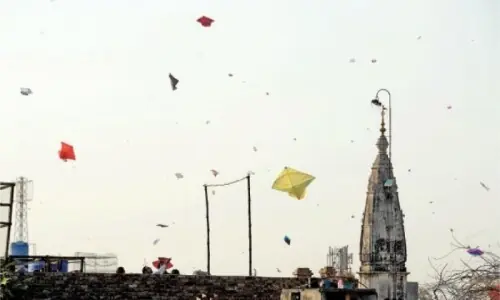ISLAMABAD: Pakistan on Friday called on the United Nations to continue monitoring and documenting human rights abuses being committed by India in occupied Kashmir.
“Pakistan reiterates its call for enhanced international monitoring of and continued UN reporting on the human rights crisis in Indian Occupied Jammu and Kashmir to save lives, dignity and freedoms of the Kashmiri people under illegal occupation for over seven decades,” the Foreign Office said in a statement.
The UN Office of the High Commissioner for Human Rights (OHCHR) had in 2018 and 2019 produced two consecutive reports pointing out serious human rights violations in occupied Kashmir, particularly excessive use of force by Indian security forces leading to civilian casualties, use of pellet guns, arbitrary detentions, and impunity enjoyed by Indian authorities and forces in the occupied territory indulging in rights abuses.
Both reports made wide ranging recommendations for addressing those violations, including one about setting up of a Commission of Inquiry, the highest-level investigation in the UN system.
India refused to accept the findings of both the reports.
There has, however, been no report on the human rights situation in the valley this year despite a sharp aggravation since the annexation of the occupied territory in August last year.
For most of the period since the illegal annexation, the region has remained under military siege, lockdown and communication blockade. The Kashmiris have been facing continued oppression including so-called cordon and search operations and fake encounters. It is estimated that about 150 people have been martyred by Indian security forces in the first six months of this year. Moreover, occupying troops have carried out ‘collective punishment’ of entire communities and neighbourhoods, and crimes against humanity.
“This excessive use of force by India is its standard modus operandi, as witnessed in the recently released picture from Indian-Occupied Jammu & Kashmir, where a three-year-old child sits on his grandfather’s blood-covered dead body in Sopore,” Human Rights Minister Shireen Mazari noted in her letter to High Commissioner for Human Rights Michelle Bachelet this week.
There have been a number of reports by human rights bodies this year highlighting the grim rights situation in Kashmir.
“The 2018 and 2019 UN Kashmir reports provided a window to the world about the scale of India’s human rights violations, aided and abetted by hundreds of thousands of occupation forces and draconian laws,” the FO said.
“The UN human rights machinery has consistently spotlighted India’s non-compliance with its international human rights obligations. Through several official communications, nearly a dozen UN Special Rapporteurs have regularly raised serious concerns over India’s consistent pattern of arbitrary arrests, detentions, torture, corporal punishment, extra-judicial killings, and physical and digital lockdown in occupied Jammu & Kashmir,” it added.
The FO said India had disregarded the international pressure and had persisted with its mode of defiance and denial.
“It rejected the two Kashmir reports and refuses to grant access to any independent international observer, organisation and media to investigate gross human rights violations. In fact, India has heightened its repression in IOJ&K taking advantage of the world’s preoccupation with the Covid-19 pandemic,” the FO said.
Emphasising the need for holding India responsible, it said India’s willful defiance of international law, democratic norms and its human rights obligations necessitated continued accountability and opprobrium, as underlined in the UN’s Kashmir Reports.
The FO also pointed towards Indian attempts to engineer demographic change in IOJ&K and convert the Kashmiri Muslim majority into a minority.
Dr Mazari in her letter had cautioned that absence of accountability for India’s actions would further embolden it.
“I request urgent intervention with respect to bringing to an end these breaches of fundamental human rights norms. If we do not act together now, we may risk further destabilisation and bloodshed in the region, which would affect millions on both sides of the Line of Control, the Pakistan-India border and in the region at large,” she said.
Published in Dawn, July 11th, 2020


































